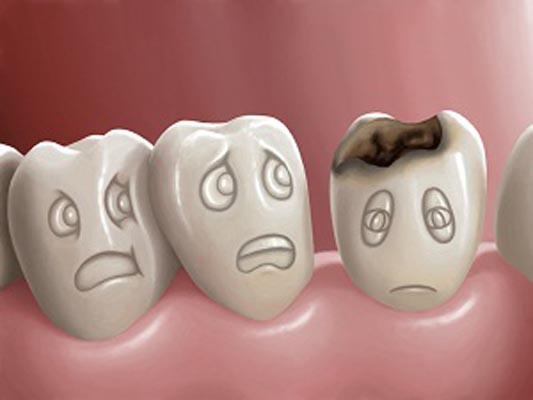Sensitive Teeth – Causes, Prevention, and Treatment
Tooth sensitivity is one of the most common dental problems we face throughout our lives. Whether we are talking about teeth sensitive to cold and hot drinks or foods, sweet teeth sensitive or simply teeth sensitive to touching with the tongue, this condition should be treated at the first signs.
The mechanism by which it occurs is simple. As the sensitivity of the teeth to exist, the stimuli that produce it must have direct contact with the tooth’s dentine. Dentine is a part of the tooth that normally on the crown (the part seen in the mouth) is covered entirely with enamel (an excellent chemical and physical insulating tissue), and at the root level is covered by a very thin layer of a material called cement that does not isolate as well as enamel, this lack being compensated by the fact that the root is covered with bone and healthy gum.
Thus, we have two situations in which dentin can be exposed: at the coronary level, through the absence of the enamel layer, or at the root level.
When the dentine loses its protective properties, these tubes allow heat, acids and other potentially dangerous substances to stimulate the nerve endings inside the dental pulp. This can cause an occasional hypersensitivity and discomfort that occurs especially when we eat or drink something too hot or too cold, too sweet or too sour, or even when we breathe in our mouths.
The most common causes of the appearance of dental sensitivity and solutions for sensitive teeth care:
Consume acidic foods
Tomatoes, citrus, wine, vinegar sauces and fruit juices are not missing from your diet? Take care of eating acidic foods because they can cause tooth enamel wear. Furthermore, eating foods or acidic drinks 4 or more times a day can lead to the risk of acid erosion or the loss of enamel on the surface of the teeth. Do not you want to exclude these foods from the diet? You can consume cheese or milk to counteract the effects of acidic foods.
You use mouthwash too often
Do you want a fresh breath? The problem is if you use dental water throughout the day – you may have problems with your teeth. The reason? Certain products contain acids that aggravate the sensitivity of the teeth.
The solution – uses dental water once or twice a day. If problems persist, opt for a neutral fluoride solution. Use a toothpaste for sensitive and high fluoride toothpaste, including mouthwashes, to help enamel enhancing.
Ginger withdrawal
Normally, the roots are covered with gums. But in the case of periodontal diseases such as gingivitis, the removal of gums near a sensitive tooth is the root exposure underlying the dental sensitivity. If you are confronted with such problems, it is very important to have a dentist.
Tooth whitening products or certain types of toothpaste
Everyone wants a bright smile, but tooth whitening products or toothpastes containing peroxide determine dental sensitivity by penetrating the tooth enamel. Sensitivity tends to disappear when you stop using those products.
Excessive or too strong tooth brushing
Tooth brushing too hard can cause the gum to retract or cause enamel wear and expose your dentine. Brush your teeth with vertical, not lateral movements.
Use a soft teeth toothbrush and a toothpaste specially designed to care for sensitive teeth. Take care of oral hygiene, including proper brushing and the use of dental floss, to prevent gum disease that may be the basis for gum removal.
Recent dental interventions
It does not seem right, but in some cases a visit to the dentist can have negative consequences. Tooth whitening treatments, coronal replacement, treatment of seals, or root canal treatment can lead to short-term teeth sensitivity.
80% of patients undergoing teeth whitening treatment will subsequently suffer from dental sensitivity. The most common tooth whitening ingredients are hydrogen peroxide and carbamide peroxide, which is known to cause dental sensitivity by penetrating the tooth enamel.
Consult your dentist regularly to perform professional teeth cleaning, get advice and advice on tooth care and dental sensitivity.
Tooth cracks
If you’re used to chewing ice, strong candies, there’s a lot of chances to prune your teeth. Once the tooth is damaged, the nerve in the dental pulp can irritate when chewing. Such a crack attracts bacteria, which leads to inflammation of the areas and causes pain.
Gnashing of teeth (bruxism)
If you spat from teeth in your sleep or teeth from your teeth during the day it is possible to cause enamel wear and exposure to the dentin layer beneath it. Over time, this habit can wear enamel and exposes nerves to danger. Ask the dentist for information about the teeth protection devices during the night.
Dental caries not properly treated
Dental caries expose the root of the tooth to a number of irritating factors: hot or cold food, sweets and even air temperature. The best way to match cavities and keep your healthy teeth is to follow proper oral hygiene and to go to the dentist regularly.
Whatever the reason, dental sensitivity is based on the loss of dentin cement from the surface of the tooth.



Recent Comments